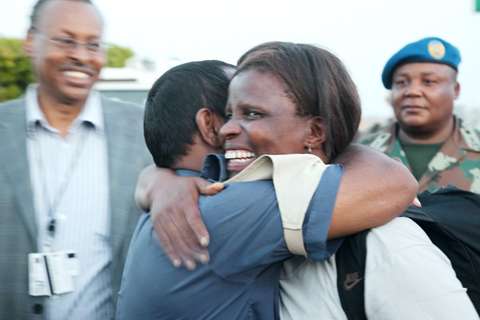Four South African peacekeepers kidnapped in Sudan’s conflict-torn Darfur region this month were released on Monday, the UN said.
The two men and two women from the joint UN/African Union UNAMID mission were kidnapped on April 11 from the region’s main town Nyala, the latest in a wave of abductions of foreign workers by young men demanding ransoms.
“We are grateful to have our colleagues back with us,” UNAMID chief Ibrahim Gambari said in a statement. “This day would not have been possible had it not been for the good cooperation of the government of the Sudan and the local authorities of South Darfur.”

PHOTO: AFP/UN-AFRICAN UNION FORCE IN SUDAN
A spokesman for a group calling itself the Movement for the Popular Struggle said on April 20 that they were holding the four and had agreed with the government to release them. The spokesman said his group had not been paid the ransom of around US$450,000 it had originally demanded.
Abductions of foreigners rose last year after the International Criminal Court (ICC) issued an arrest warrant for President Omar Hassan al-Bashir for war crimes in the region, charges he denies.
The UN statement said Gambari held a meeting on Sunday with al-Bashir, who had “pledged to do everything possible to assist in bringing about the safe return of the UNAMID personnel.”
Sudan’s National Elections Commission confirmed on Monday that Bashir was elected president after five days of voting last week.

Thousands gathered across New Zealand yesterday to celebrate the signing of the country’s founding document and some called for an end to government policies that critics say erode the rights promised to the indigenous Maori population. As the sun rose on the dawn service at Waitangi where the Treaty of Waitangi was first signed between the British Crown and Maori chiefs in 1840, some community leaders called on the government to honor promises made 185 years ago. The call was repeated at peaceful rallies that drew several hundred people later in the day. “This government is attacking tangata whenua [indigenous people] on all

RIGHTS FEARS: A protester said Beijing would use the embassy to catch and send Hong Kongers to China, while a lawmaker said Chinese agents had threatened Britons Hundreds of demonstrators on Saturday protested at a site earmarked for Beijing’s controversial new embassy in London over human rights and security concerns. The new embassy — if approved by the British government — would be the “biggest Chinese embassy in Europe,” one lawmaker said earlier. Protester Iona Boswell, a 40-year-old social worker, said there was “no need for a mega embassy here” and that she believed it would be used to facilitate the “harassment of dissidents.” China has for several years been trying to relocate its embassy, currently in the British capital’s upmarket Marylebone district, to the sprawling historic site in the

‘IMPOSSIBLE’: The authors of the study, which was published in an environment journal, said that the findings appeared grim, but that honesty is necessary for change Holding long-term global warming to 2°C — the fallback target of the Paris climate accord — is now “impossible,” according to a new analysis published by leading scientists. Led by renowned climatologist James Hansen, the paper appears in the journal Environment: Science and Policy for Sustainable Development and concludes that Earth’s climate is more sensitive to rising greenhouse gas emissions than previously thought. Compounding the crisis, Hansen and colleagues argued, is a recent decline in sunlight-blocking aerosol pollution from the shipping industry, which had been mitigating some of the warming. An ambitious climate change scenario outlined by the UN’s climate

’SOVEREIGNTY’: The decision is based on ‘profound differences in health management, especially during the [COVID-19] pandemic,’ a spokesperson for Javier Milei said Argentina’s president has ordered the country’s withdrawal from the WHO due to “profound differences” with the UN agency, a presidential spokesperson said on Wednesday. Argentine President Javier Milei’s decision echoes that of his ally, US President Donald Trump, who began the process of pulling the US out of the WHO with an executive order on his first day back in office on Jan. 21. The loss of another member country would further fracture cooperation in global health, although Argentina was expected to provide only about US$8 million to the WHO for the agency’s estimated US$6.9 billion budget for last year and this